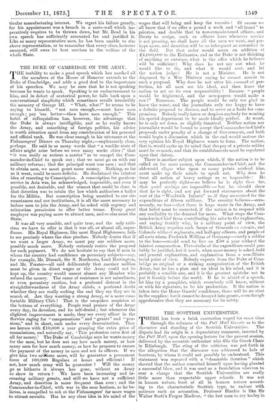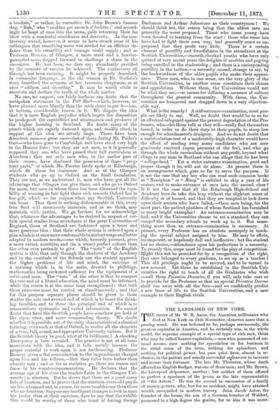THE SCOTTISH UNIVERSITIES.
THERE has been a brisk contention waged for some time through the columns of the Pall Mall Gazette as to the character and standing of the Scottish Universities. The dispute had its origin in a depreciatory comment, inserted by the Pall Mall, upon the opening lecture for the present session, delivered by the eccentric enthusiast who fills the Greek Chair in Edinburgh. The sting of the criticism was put forth in the allegation that the discourse was addressed to lads of fourteen, by whom it could not possibly be understood. This statement was repeated with a " damnable iteration " which showed that the author conceited himself upon having planted a successful blow, and it was used as a foundation whereon to rear a charge that the Scottish Universities are really little more than respectable upper schools. It was not in human nature, least of all in human nature accord- ing to the characteristic Scottish type, to endure with patience such an accusation. Professor Blackie is like Sir Walter Scott's Fergus Maclvor, " the last man to cry barley in bruilzie," or rather, he resembles Dr. John Brown's famous dog, " Rab," who " couldna get eneuch o' fechtin ;" and accord- ingly he leapt at once into the arena, gaily returning blow for blow with a wonderful nimbleness and dexterity. As the con- troversy waxed, however, it seems to have struck some of his .colleagues that something more was needed for an efficient de- fence than his versatility and courage could supply ; and so Professor Ramsay, of Glasgow, a more staid and a heavier- panoplied man, stepped forward to challenge a share in the encounter. He has been, we dare say, abundantly gratified by the measure of success he achieved. The controversy all through has been amusing. It might be properly described, in vernacular language, as the old woman in Dr. Guthrie's story described. the sermons of her favourite clergyman, as at once " edifyen and diverting." It may be worth while to -ascertain and declare the truth of the whole matter.
No one, we suspect, can fairly harbour any doubt that the outspoken statement in the Pall Mall—which, however, we have phrased more bluntly than the critic chose to put it—has, at bottom, considerable reason in it. We dispute the idea that it is mere English prejudice which begets the disposition to pooh-pooh the capabilities and attainments and products of the higher learning in Scotland. No doubt many of the proofs which are eagerly fastened upon, and readily cited, in support of this idea are utterly inept. There have been Aberdeen men—a great succession of them during Mr. Fuller's time—who have gone to Cambridge, and have stood very high in the Honour lists ; but they are not men, as it is generally supposed they are, who have passed their full curriculum at Aberdeen ; they are only men who, in the earlier part of their course, have disclosed the possession of those " preg- nant parts," of which Mr. Forster lately spoke at Edinburgh, which fit them for eminence. And so of the Glasgow students who go up to Oxford on the Snell foundation. They are not, as we understand it, men who have got all the advantage that Glasgow can give them, and who go to Oxford for more, but men in whom there has been discerned the capa- bility of winning in fair fight those rich rewards Oxford has in her gift, which so far surpass what any Scottish University can boast. That there is nothing dishonourable in this, every true Scot will strenuously maintain, and as we think, may maintain with justice. We go farther, for we acknowledge that, whatever the advantages to be derived in respect of cer- tain special studies from attendance at the great Universities of England, those of Scotland are fashioned upon a truer and snore generous idea ; that their whole system is ordered upon a plan which is at once more conformable to ancient usage and better adapted to modern needs,—one which, honestly pursued, gives a more varied, nutritive, and (in a sense) perfect culture than the other even pretends to give. The "note" of the English system is this, that only through the shadows of the Academy and by the vestibule of the Schools can the student approach the higher problems of life and mind, the outcome of a training which is, in the main, devoted to philology, mathematics being reckoned sufficient for the equipment of a cultivated man. The "note" of the other is that to compass the true end of a liberal education, the mind must be informed, while the reason is at the same time strengthened ; that both these processes must be carried on simultaneously ; and that for this purpose separate places should be given to those studies the sole and avowed end of which is to brace the think- ing faculties, and to those the principal end of which is to communicate systematic and varied information. We cannot doubt that here the Scottish people have somehow got hold of the riper, wiser, and more commanding theory. We doubt -whether it is possible, out of the unity characteristic of a classical training, even such as that of Oxford, to evolve all the elements of a true, full, sound, and appropriate University tuition. But if the Scottish theory be good, what of its fulfilment ? A shocking -discrepancy is here revealed. The practice is not at all com- mensurate with the idea, and it fails mainly because the proper material to work upon is not forthcoming. Professor Ramsay gives a flat contradiction to the impeachment charged upon him and his fellows, —that they tutor boys rather than educate men ; and so far as statistics go, there are reason and force in his counter-representation. He declares that the average age of his class (he teaches Latin in the Glasgow Uni- versity) is nineteen. But he shows that there are a good many lads of fourteen, and he proves that the nineteen-years-old pupils are less advanced and, in a sense, far more troublesome than those who are fourteen. Suppose any intelligent stranger to look in upon his junior class at their exercises, dare he say that the exhibi- tion would be worthy of those who boast of having George
Buchanan and Arthur Johnstone as their countrymen ? We should think not, the reason being that the oldest men are generally the worst prepared. Those who come young have been devoted to learning from the start ; those who come late have had to fight their own way, and generally come so un- prepared that they profit very little. There is a certain element of puerility and dwarfishness in the attendance at the Scottish Universities,—smooth-cheeked youths who have only quitted of very recent years the delights of marbles and peg-top being enrolled in the studentship ; and there is a corresponding puerility in the tuition,—a necessity caused, strange to say, by the backwardness of the older pupils who make their appear- ance. These men, who, in one sense, are the very glory of the Scottish Universities, in another sense constitute their shame and opprobrium. Without them, the Universities would not be what they are,—as means for diffusing a measure of culture throughout the general community. With them, the Uni- versities are hampered and dragged down in a very objection- able way.
What is the remedy? A stiff entrance-examination, most peo- ple are likely to say. Well, no doubt that would be in so far an effectual safeguard against the present degradation of the Pro- fessors, who—let them talk as they will—really find themselves forced, in order to do their duty to their pupils, to stoop low enough for schoolmaster's drudgery. And we do not doubt that a matriculation-test of a moderately-high character would have the effect of sending away many candidates who are now graciously received (upon payment of the fee), and who go through the whole curriculum without any profit, beyond what clings to any man in Scotland who can allege that he has been " college-bred." Yet a strict entrance examination, good and proper though it be, will not do alone. At present there is an arrangement which goes so far to serve the purpose. Is it not the case that any boy who can read such common books as " Xenophon " or " 2Esop " is entitled to skip a year of his course, and to make entrance at once into the second class ? Is it not the case that all the Edinburgh High-School and Academy boys do take this leap without the slightest sense of difficulty or of hazard, and that they are tempted to look down upon their seniors who have failed,—these men being, for the most part, the patient plodders of whom Scotland has furnished so many bright examples ? An entrance-examination may be had, and if the Universities choose to set a standard, they can compel the secondary schools to work up to it. But some- thing more than an entrance-examination is necessary. At present, every Professor has an absolute monopoly in teach- ing the special subject assigned to him. He may be effete, incompetent, or hopelessly dull and ineffective ; but the student has no choice,—attendance upon his prelections is a necessity. To remedy this, scope must be found for the play of competition. Might this not be provided for by a recognition of the right, that once belonged to every graduate, to set up as a teacher ? This old privilege ought to be revived, and to be turned to new account. Let there be established in the Scottish Uni- versities the right to teach of all the Graduates who wish —call them Privatint Docentes, if you will, only take care so to provide for the Professor as that no special Privatint Docens shall run away with all the fees—and we confidently predict a new lease of life to the Scottish Universities, and a new example to their English rivals.







































 Previous page
Previous page